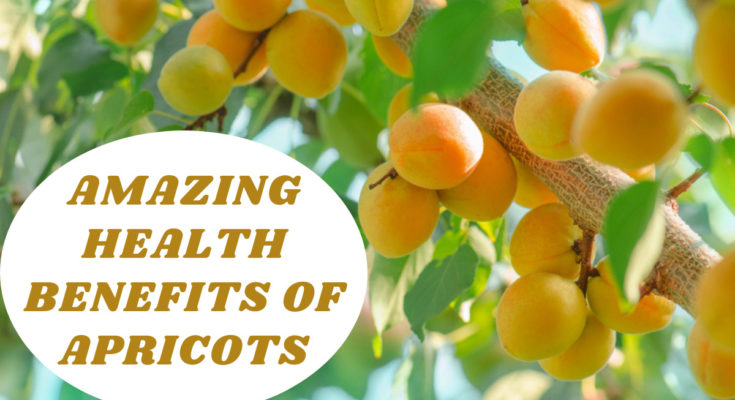Apricot is a fruit that belongs to the Rosaceae family and is native to Central and East Asia. It is a small, round fruit with a slightly fuzzy skin that is usually yellow or orange in color. The flesh of the fruit is sweet and juicy, with a slightly tangy flavor. Apricots are commonly eaten fresh, but can also be dried or used in cooking, baking, and preserves.
Apricots are a good source of vitamin A, vitamin C, and dietary fiber, and are also rich in potassium and antioxidants. They have several health benefits, including promoting good vision, aiding digestion, and supporting heart health. Additionally, apricots are low in calories, making them a great snack for those trying to maintain a healthy weight.
HEALTH BENEFITS :-
Apricots are delicious and nutritious fruits that offer a wide range of health benefits. Packed with essential vitamins, minerals, and antioxidants, apricots make a valuable addition to a balanced diet. Let’s explore some of the health benefits of apricots and why you should consider incorporating them into your daily routine.
Apricots offer several health benefits due to their nutrient content. Here are some of the potential health benefits of consuming apricots:
1. Good for eye health: Apricots contain a high amount of vitamin A, which is essential for good eye health. Vitamin A helps protect the eyes from age-related macular degeneration, cataracts, and other eye disorders.
2. May boost immunity: Apricots are a good source of vitamin C, which is known to boost immunity by helping to stimulate the production of white blood cells. This vitamin also acts as an antioxidant, helping to protect cells from damage caused by free radicals.
3. Supports digestive health: Apricots are rich in dietary fiber, which helps promote healthy digestion by adding bulk to the stool and preventing constipation. The fiber in apricots also helps feed the beneficial bacteria in the gut, which can improve overall digestive health.
4. May reduce inflammation: Apricots contain flavonoids and phenolic compounds, which have anti-inflammatory properties. These compounds can help reduce inflammation in the body, which is a contributing factor to many chronic diseases.
5. Supports heart health: Apricots are rich in potassium, which is essential for maintaining a healthy heart. Potassium helps regulate blood pressure, reduces the risk of stroke, and improves overall heart health.
6. May aid weight loss: Apricots are low in calories and high in fiber, making them a great snack for those trying to lose weight. The fiber in apricots helps keep you feeling full for longer, reducing the likelihood of overeating.
7. Rich in Nutrients: Apricots are a good source of essential vitamins and minerals, including vitamin A, vitamin C, vitamin E, potassium, and dietary fiber. Vitamin A promotes healthy vision and supports the immune system, while vitamin C is essential for collagen production and immune function. Potassium helps maintain proper heart function, and dietary fiber aids digestion.
8. Antioxidant Powerhouse: Apricots are loaded with antioxidants, including beta-carotene, lutein, and zeaxanthin. These antioxidants protect the body against oxidative stress caused by free radicals, which may contribute to chronic diseases and aging. Regular consumption of apricots can help reduce the risk of various illnesses, including heart disease and certain types of cancer.
9. Eye Health: The high levels of vitamin A and antioxidants in apricots make them excellent for maintaining healthy eyes. Vitamin A is crucial for good vision and may help prevent age-related macular degeneration and cataracts. Lutein and zeaxanthin, found abundantly in apricots, are known to protect the eyes from damage caused by harmful blue light.
10. Digestive Health: Apricots are rich in dietary fiber, which supports healthy digestion and helps prevent constipation. Fiber adds bulk to the stool, aiding regular bowel movements and promoting a healthy digestive system. Including apricots in your diet can contribute to better gut health and overall digestion.
11. Heart Health: The potassium content in apricots is beneficial for heart health. Potassium helps regulate blood pressure by counteracting the effects of sodium and reducing tension in blood vessels. A diet rich in potassium, combined with a low sodium intake, may help lower the risk of heart disease and stroke.
12. Skin Health: The antioxidants and vitamin E in apricots play a significant role in maintaining healthy skin. Antioxidants protect the skin from damage caused by free radicals, which can lead to premature aging. Vitamin E helps nourish the skin, promotes elasticity, and supports overall skin health.
Incorporating apricots into your diet is easy. You can enjoy them fresh, dried, or in various recipes. Add sliced apricots to your morning cereal or yogurt, blend them into smoothies, or use them in salads and desserts for a burst of flavor and nutritional benefits.
Remember to choose ripe apricots that are slightly soft, with a vibrant orange color. If fresh apricots are not available, dried apricots are a great alternative, as they retain most of the fruit’s nutrients. However, be mindful of the sugar content in dried apricots and consume them in moderation.
In conclusion, apricots are not only delicious but also offer numerous health benefits. From promoting eye health and aiding digestion to boosting heart health and supporting skin health, apricots are a fantastic addition to a wholesome diet. So, next time you’re at the grocery store, grab a bag of apricots and enjoy their natural goodness.
HOW TO USE :-
Apricots can be enjoyed in a variety of ways, including fresh, dried, or cooked. Here are some ideas for how to use apricots:
1. Eat them fresh: Simply wash the apricots, remove the pit, and enjoy them as a healthy snack. They are delicious on their own, or you can add them to a fruit salad for extra flavor and nutrition.
2. Use them in baking: Apricots can be used in a variety of baked goods, such as muffins, cakes, and bread. You can also make a homemade apricot jam or jelly.
3. Add them to salads: Dried apricots can add a sweet and tangy flavor to salads. Chop them up and add them to your favorite salad for a nutritious boost.
4. Make a smoothie: Blend fresh or frozen apricots with your favorite fruits and vegetables to make a healthy and delicious smoothie.
5. Grill them: Cut fresh apricots in half and grill them for a sweet and caramelized flavor. You can also add them to kebabs with other fruits or meats.
6. Use them in savory dishes: Apricots can be used in savory dishes as well, such as tagines, stews, and curries. The sweetness of the apricots can help balance out spicy or savory flavors.
7. Snack on dried apricots: Dried apricots make a great on-the-go snack and can also be added to trail mix or granola.
No matter how you choose to use them, apricots are a nutritious and delicious addition to any diet.
DIFFERENT TYPES OF APRICOTS :-
There are several different types of apricots, including:
1. Early Golden: This variety of apricot is one of the earliest to ripen and has a bright yellow skin and sweet flesh.
2. Blenheim: Also known as Royal or California apricots, Blenheim apricots are one of the most popular types in the United States. They have a rich, sweet flavor and are often used for drying.
3. Moorpark: Moorpark apricots are a larger variety with a bright orange skin and juicy, flavorful flesh.
4. Rival: Rival apricots are a newer variety that are resistant to bacterial spot disease. They have a tangy-sweet flavor and are often used for canning.
5. Chinese: Chinese apricots have a slightly tart flavor and are often used in Chinese cuisine for sweet and sour dishes.
6. Hunza: Hunza apricots are grown in the Hunza valley of Pakistan and have a unique flavor that is both sweet and sour.
7. Israeli: Israeli apricots are a newer variety that are known for their large size and sweet, juicy flesh.
8. Tomcot: Tomcot apricots are a hybrid variety that is a cross between a Turkish apricot and a California apricot. They have a tangy-sweet flavor and are often used for canning.
These are just a few examples of the many types of apricots that exist. The flavor, texture, and appearance of apricots can vary depending on the growing conditions and variety.
NUTRITIONAL FACTS :-
Apricots are a nutritious fruit that provide several essential vitamins and minerals. Here are some of the key nutritional facts about apricots:
Apricots are a good source of dietary fiber, which can help promote digestion and prevent constipation.
They are also a good source of vitamin A, which is important for maintaining healthy vision, skin, and immune function.
Apricots contain high levels of vitamin C, an antioxidant that helps protect cells from damage and supports the immune system.
They are a source of potassium, a mineral that is essential for maintaining healthy blood pressure and heart function.
Apricots are low in calories, with just 48 calories per 100 grams.
They are also low in fat and sodium.
Apricots contain natural sugars, including fructose and glucose, which can provide a quick source of energy.
It’s worth noting that dried apricots have a higher concentration of nutrients, including fiber, vitamin A, and potassium, than fresh apricots. However, they are also higher in calories and sugar, so should be consumed in moderation.
NUTRITIONAL VALUE :-
Apricots have a good nutritional value, providing a range of vitamins, minerals, and antioxidants. Here is a breakdown of the nutritional value of apricots:
Calories: One fresh apricot (35g) contains approximately 17 calories.
• Carbohydrates: Apricots are a good source of carbohydrates, providing around 4 grams per apricot. The main carbohydrate in apricots is sugar, with small amounts of fiber.
• Vitamins: Apricots are particularly high in vitamin A and vitamin C. One apricot can provide approximately 10% of the daily recommended intake of vitamin A and around 3% of vitamin C.
• Minerals: Apricots are a good source of potassium, providing around 4% of the daily recommended intake per apricot. They also contain small amounts of other minerals, such as calcium and iron.
• Antioxidants: Apricots contain antioxidants such as carotenoids, which are beneficial for maintaining healthy cells and reducing inflammation in the body.
Here is a more detailed nutritional breakdown for fresh apricots based on a serving size of one medium fruit (about 35 grams):
- Calories: 17
- Carbohydrates: 4 grams
- Fiber: 1 gram
- Sugar: 3 grams
- Protein: 0.4 grams
- Fat: 0.1 grams
- Vitamin A: 674 IU (13% of the Daily Value)
- Vitamin C: 1.4 mg (2% of the Daily Value)
- Vitamin E: 0.2 mg (1% of the Daily Value)
- Vitamin K: 1.5 mcg (2% of the Daily Value)
- Thiamin (Vitamin B1): 0.0 mg (1% of the Daily Value)
- Riboflavin (Vitamin B2): 0.0 mg (2% of the Daily Value)
- Niacin (Vitamin B3): 0.4 mg (2% of the Daily Value)
- Vitamin B6: 0.0 mg (1% of the Daily Value)
- Folate: 4 mcg (1% of the Daily Value)
- Pantothenic Acid (Vitamin B5): 0.2 mg (2% of the Daily Value)
- Potassium: 149 mg (4% of the Daily Value)
- Calcium: 3 mg (0.3% of the Daily Value)
- Iron: 0.2 mg (1% of the Daily Value)
- Magnesium: 3 mg (1% of the Daily Value)
- Phosphorus: 8 mg (1% of the Daily Value)
- Zinc: 0.1 mg (1% of the Daily Value)
It’s worth noting that the nutritional value of apricots can vary slightly depending on the specific variety, growing conditions, and other factors. Dried apricots also have a different nutritional profile due to their concentrated sugar and fiber content.



